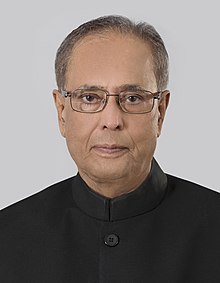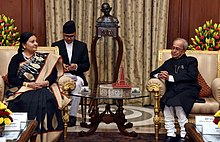Pranab Mukherjee | |
|---|---|
 Official portrait, 2012 | |
| 13th President of India | |
| In office 25 July 2012 – 25 July 2017 | |
| Prime Minister | |
| Vice President | Mohammad Hamid Ansari |
| Preceded by | Pratibha Patil |
| Succeeded by | Ram Nath Kovind |
| Minister of Finance | |
| In office 24 January 2009 – 26 June 2012 | |
| Prime Minister | Manmohan Singh |
| Preceded by | Manmohan Singh |
| Succeeded by | Manmohan Singh |
| In office 5 January 1982 – 31 December 1984 | |
| Prime Minister | |
| Preceded by | R. Venkataraman |
| Succeeded by | V. P. Singh |
| Minister of Defence | |
| In office 22 May 2004 – 26 October 2006 | |
| Prime Minister | Manmohan Singh |
| Preceded by | George Fernandes |
| Succeeded by | A. K. Antony |
| Minister of External Affairs | |
| In office 24 October 2006 – 22 May 2009 | |
| Prime Minister | Manmohan Singh |
| Preceded by | Manmohan Singh (acting) |
| Succeeded by | S. M. Krishna |
| In office 10 February 1995 – 16 May 1996 | |
| Prime Minister | P. V. Narasimha Rao |
| Preceded by | Dinesh Singh |
| Succeeded by | Sikander Bakht |
| 15th Leader of the Lok Sabha | |
| In office 22 May 2004 – 26 June 2012 | |
| Preceded by | Atal Bihari Vajpayee |
| Succeeded by | Sushilkumar Shinde |
| Deputy Chairman of the Planning Commission | |
| In office 24 June 1991 – 15 May 1996 | |
| Prime Minister | P. V. Narasimha Rao |
| Preceded by | Mohan Dharia |
| Succeeded by | Madhu Dandavate |
| 14th Leader of the Rajya Sabha | |
| In office January 1980 – 31 December 1984 | |
| Preceded by | K. C. Pant |
| Succeeded by | V. P. Singh |
| Member of Parliament, Lok Sabha | |
| In office 10 May 2004 – 26 June 2012 | |
| Preceded by | Abul Hasnat Khan |
| Succeeded by | Abhijit Mukherjee |
| Constituency | Jangipur |
| Member of Parliament, Rajya Sabha | |
| In office 10 July 1969 – 10 July 1981 | |
| Constituency | West Bengal |
| In office 14 August 1981 – 13 August 1987 | |
| Constituency | Gujarat |
| Personal details | |
| Born | 11 December 1935 Mirati, Bengal Presidency, British India (present-day West Bengal, India) |
| Died | 31 August 2020 (aged 84) New Delhi, India |
| Political party | Indian National Congress (1972–1986; 1989–2020) |
| Other political affiliations |
|
| Spouse | |
| Children | 3, including Sharmistha and Abhijit |
| Alma mater | University of Calcutta (BA, MA, LL.B.) |
| Awards | Bharat Ratna (2019)[1] Padma Vibhushan (2008) |
| Website | pranabmukherjee.nic.in (defunct) |
| Nicknames |
|
Pranab Kumar Mukherjee (11 December 1935 – 31 August 2020) was an Indian politician who served as the 13th president of India from 2012 until 2017. He was the first person from West Bengal to hold the post of President of India. In a political career spanning five decades, Mukherjee was a senior leader in the Indian National Congress and occupied several ministerial portfolios in the Government of India.[3] Prior to his election as President, Mukherjee was Finance Minister from 2009 to 2012. He was awarded India's highest civilian honour, the Bharat Ratna, in 2019, by his successor as president, Ram Nath Kovind.[4]
Mukherjee got his break in politics in 1969 when the then Prime Minister Indira Gandhi helped him get elected to the Rajya Sabha, the upper house of Parliament of India, on a Congress ticket.[5] Following a meteoric rise, he became one of Gandhi's most trusted lieutenants and a minister in her cabinet in 1973. Mukherjee's service in a number of ministerial capacities culminated in his first stint as Finance Minister of India in 1982–84. He was also the Leader of the House in the Rajya Sabha from 1980 to 1985.[6]
Mukherjee was sidelined from Congress during the premiership of Rajiv Gandhi. Mukherjee had viewed himself and not the inexperienced Rajiv, as the rightful successor to Indira following her assassination in 1984. Mukherjee lost out in the ensuing power struggle. He formed his own party, the Rashtriya Samajwadi Congress, which merged with Congress in 1989 after reaching a consensus with Rajiv Gandhi.[7] After Rajiv Gandhi's assassination in 1991, Mukherjee's political career was revived when Prime Minister P. V. Narasimha Rao appointed him Planning Commission head in 1991 and foreign minister in 1995. Following this, as an elder statesman of Congress, Mukherjee was the principal architect of Sonia Gandhi's ascent to the party's presidency in 1998.[8]
When the Congress-led United Progressive Alliance (UPA) came to power in 2004, Mukherjee won a Lok Sabha (the popularly elected lower house of Parliament) seat for the first time. From then until his resignation in 2012, he held a number of key cabinet portfolios in Prime Minister Manmohan Singh's government – Defence (2004–06), External Affairs (2006–09), and Finance (2009–12) – apart from heading several Groups of Ministers (GoMs) and being Leader of the House in the Lok Sabha.[9] After securing the UPA's nomination for the country's presidency in July 2012, Mukherjee comfortably defeated P. A. Sangma of NDA in the 2012 Indian presidential election, winning 70 per cent of the electoral-college vote.[10]
In 2017, Mukherjee decided not to run for re-election and to retire from politics after leaving the presidency due to "health complications relating to old age." His term expired on 25 July 2017.[11][12][13] He was succeeded as president by Ram Nath Kovind. In June 2018, Mukherjee became the first former President of India to address a Rashtriya Swayamsevak Sangh (RSS) event.[14]

- ^ "Bharat Ratna for Pranab Mukherjee, Nanaji Deshmukh and Bhupen Hazarika". Times Now. 25 January 2019. Archived from the original on 31 August 2020. Retrieved 25 January 2019.
- ^ Dasgupta, Partha (24 July 2012). "Pranab is still 'Poltuda' in his ancestral village of 'Mirati' in West Bengal". indiatoday.in. India Today. Archived from the original on 1 September 2020. Retrieved 31 August 2020.
- ^ "In coalition govts, it's difficult to reconcile regional with national interests: Pranab Mukherjee". The Times of India. Archived from the original on 20 October 2017. Retrieved 19 October 2017.
- ^ "Bharat Ratna for Pranab Mukherjee fitting recognition for his service to nation: PM Modi". The Hindu. PTI. 9 August 2019. ISSN 0971-751X. Archived from the original on 8 November 2020. Retrieved 4 December 2020.
- ^ "Pranab Mukherjee passes away: A glimpse into Congress stalwart's life – Early Life". The Economic Times. Archived from the original on 7 April 2023. Retrieved 4 December 2020.
- ^ "Pranab Mukherjee". www.goodreads.com. Archived from the original on 5 July 2021. Retrieved 4 December 2020.
- ^ Gujral, Inder Kumar (2011). Matters of Discretion: An Autobiography. Penguin Books Publication. pp. 56–63. ISBN 978-93-8048-080-0. Archived from the original on 28 July 2023. Retrieved 4 December 2020.
- ^ Cite error: The named reference
europe.eu2was invoked but never defined (see the help page). - ^ "Pranab Mukherjee". The Indian Express. Archived from the original on 17 August 2020. Retrieved 4 December 2020.
- ^ "India votes Pranab Mukherjee as 13th President of India". The Times of India. 22 July 2012. Archived from the original on 29 September 2013. Retrieved 4 December 2020.
- ^ Sachidananda Murthy (27 December 2015). "And the next President is..." english.manoramaonline.com/home.html. Manorama Online. Archived from the original on 26 April 2016. Retrieved 28 April 2016.
- ^ "Presidential Election 2017: Pranab Mukherjee retires in July, this is how India elects its president". 2 May 2017. Archived from the original on 22 August 2017. Retrieved 22 August 2017.
- ^ "Presidential Election 2017: Not in race for another term, says Pranab Mukherjee". 25 May 2017. Archived from the original on 22 August 2017. Retrieved 22 August 2017.
- ^ "Pranab Mukherjee describes RSS founder Hedgewar as 'great son of Mother India'". The Times of India. Archived from the original on 31 August 2020. Retrieved 14 August 2018.